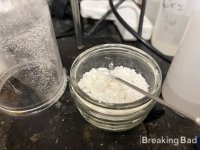After the reduction, most of the amine will be in the IPA, you can try to extract from the water with IPA, clean the combined IPA and and dry it. Then you drop in if you access to 20% H2SO4 in IPA. To pH 7 or 6.5 can't remember the specifics. You will create the mescaline hemisulfate so 2 mesc. molecules to 1 sulfuric acid. Or 1/2 mol amount of H2SO4 (calculated for a rough 80% yield from the nitrostyrene).
You do not need to basify after all. No need to quench the reaction with NaOH. Better to quickly filter off the copper, extract 2x the aq. layer with IPA, clean the combined IPA with a 50% solution of K2CO3 two times. Then dry with magnesium sulfate, gravity filter off the magnesium sulfate. Then drop in the 20% H2SO4 in IPA (prepared from 98% clean concentrated H2SO4).
If you do not have any H2SO4, use HCl, in this case evaporate or distill off the IPA until you are left with freebase mescaline oil. Then drop slowly in an 80% mol eq. of HCl (rough estimate), diluted (rough estimate). Be careful as always when salting. For HCl maybe aim for pH 5 - 6. You can always do only half of the freebase oil at once, if you overshot the pH, I guess you can always pour some mesc. freebase back in to stabilize the pH.
Now I have only experience with mesc. hcl, at this point you need to once again evaporate off water to get this sticky nasty sludge of Mesc. HCl, you would need to freebase this with KOH to 10 - 11 pH and salt again with HCl to get a cleaner form. Extract 3x with DCM once you have basified with KOH, calculate amount of HCl. again and dilute the HCl. Drop in the HCl, watch carefully, past 7 pH it drops very quickly, one or two drops more is all you need sometimes.
Then distill/ evap off the DCM and then the water. You should have a cleaner product. Maybe an orange paste.
Now take this once mostly dry and under vacuum clean with cold ethyl acetate, then cold acetone. Copious amount of acetone.
Next time I will prepare the crude mesc. hemisulfate first. It should be much cleaner than the initial HCl. So will report back then.
No need to use DCM, initially you should salt the IPA layer directly. Most of the amine is there!
As for the actual reaction, I do not have trouble with it. Try to drop in the copper chloride all at once into the center of your reaction mixture. It is a violent reaction so if you are working with larger amounts remember to transfer to a large container JUST for the entire copper chloride drop. Maybe a 5 L or 20 L beaker, then pour everything back into your round bottom flask, and mix like crazy, heat a bit so it warms to 75 C. Ater you dropped in the copper chloride, spin for an 1 hour - 1h30min.
Also do not leave everything out for too long, think you need to run the reaction with the sodium borohydride and directly after with the copper at once.

